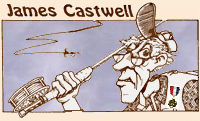|
Quite often what I write about is more intended for
those somewhat new to fly fishing. Well, I apologize
for that, but they are the ones who need it. The drag
system on reels seems to be an area where there seems
to be a lack of good information. Not that there aren't
plenty of opinions. They abound. One problem is that no
one wants to admit they made a silly decision when they
bought a fly reel. Did I ever make a poor choice buying
a fly reel? Of course not. Could I have made a wiser
choice? Certainly.
First of all, this is not a life and death situation. A
reel is a reel. There is just so much it can do. Hold line.
Go around. Make noise or not. Have a rim drag or not. Have
a real drag or just a clicker. Be colored or not. Have holes
or not have holes. Hey, wait a minute. This was supposed to
be simple. They can weigh too much? Not fit on the rod? Not
'balance' with the rod (what ever that means)? Right or left
handed, but some do not reverse? Large arbor really means
what? Direct drive is? Do I need anti-reverse? A multiplier?
Die cast or machined? Bar stock? What actually is 'Aircraft
Grade Aluminum? Is a reel that cranks on the left side 'ported'?
Ok, I'll quit. Let's just talk about drag for today.
Most of what you have heard, read, seen, been told or think
you know, is hype. Not all, but most of it. More fish have
been caught over the years by fly reels that did not have
much more than a poor drag screw that was intended to put
enough spring pressure on the spool so it didn't keep
spinning when you pulled out line. Like when a big fish did
it really fast. From that point, all of the rest developed.
A great share of us will be fishing for and catching small
fish, trout and panfish. Little guys under twelve inches.
So far no one has convinced me that I need a disc-drag to
stop a foot-long freight-train trout. The drag on reels that
are sized to hold fly lines weight five down can be simple.
A click-pawl will actually do fine. For years that was about
all there was anyway. There wasn't even an exposed rim, you palmed
the spinning handles of the reel. Knickname for them was
'knuckle-buster.'
Above that weight you might start to consider what you are
actually going after and whether it will be in fresh or salt
or both. Here price and type do start to play a part. Since
most new flyfishers start out after small fish these
questions do not usually arise. In the larger sizes there
are nearly as many types of drags as there are brands. Each
manufacturer seems to have his own idea of how a drag should
be constructed. Here you have to use your own judgement. The
bigger and faster the fish, the better and smoother the drag
should be.
If you are using a leader that will hold ten pounds you might
consider a drag system that can withstand continuous running
without glazing over or jamming. Price will be an issue here.
So will brand identification and other features including
color and shape and name of the maker.
Indeed disc brakes and all of the other types will become
involved now. Whether you go for one or the other, it will
probably hold true that the more expensive the reel, the
more tolerant of harsh elements it will be, the more
dependable the drag. One way clutches are popular and
contribute to the smoothness of the drag. Without that
feature a series of teeth are engaged and the reel will
spin a given amount before a dog catches in one of them.
This can cause the reel to pause ever so slightly. Some
claim this may tend to break tippet's. I happen to agree
with them more often than not.
What do I use? All kinds and types. But then again, I have
a wide assortment of rods and fish many different conditions.
My reels are all the way from just a clicker to a few that
will stop a barracuda or a salmon; and have. Well, at least
slowed them down some. For you just getting started, be
careful you don't drop your reel, it can get bent and
cause troubles. Keep them cleaned and oiled. Take care of
them and they will last many years. Chances of you actually
ever wearing one out are slim. But, if you do, I am happy
for you. You have certainly spent more time on the water
than I have. ~ JC
|



